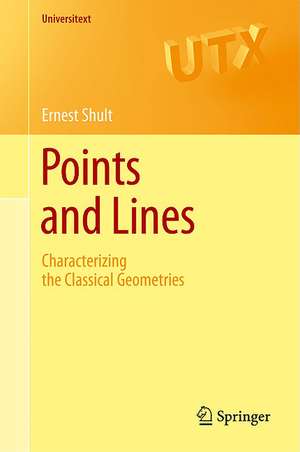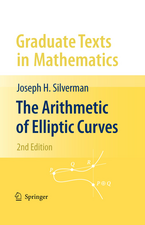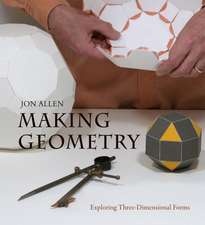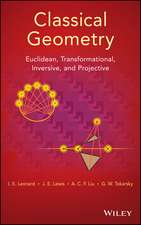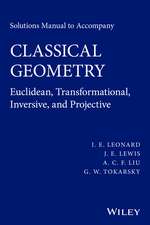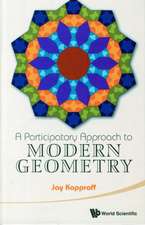Points and Lines: Characterizing the Classical Geometries: Universitext
Autor Ernest E. Shulten Limba Engleză Paperback – 20 dec 2010
Din seria Universitext
- 13%
 Preț: 353.48 lei
Preț: 353.48 lei -
 Preț: 418.67 lei
Preț: 418.67 lei -
 Preț: 465.61 lei
Preț: 465.61 lei -
 Preț: 371.98 lei
Preț: 371.98 lei - 17%
 Preț: 394.41 lei
Preț: 394.41 lei -
 Preț: 356.77 lei
Preț: 356.77 lei - 17%
 Preț: 364.56 lei
Preț: 364.56 lei - 15%
 Preț: 543.75 lei
Preț: 543.75 lei - 15%
 Preț: 497.21 lei
Preț: 497.21 lei -
 Preț: 634.38 lei
Preț: 634.38 lei -
 Preț: 396.53 lei
Preț: 396.53 lei - 17%
 Preț: 431.50 lei
Preț: 431.50 lei - 13%
 Preț: 355.51 lei
Preț: 355.51 lei -
 Preț: 360.07 lei
Preț: 360.07 lei - 17%
 Preț: 365.34 lei
Preț: 365.34 lei -
 Preț: 358.44 lei
Preț: 358.44 lei - 15%
 Preț: 553.33 lei
Preț: 553.33 lei - 17%
 Preț: 364.81 lei
Preț: 364.81 lei -
 Preț: 673.45 lei
Preț: 673.45 lei - 15%
 Preț: 509.58 lei
Preț: 509.58 lei - 17%
 Preț: 427.32 lei
Preț: 427.32 lei - 17%
 Preț: 426.76 lei
Preț: 426.76 lei - 17%
 Preț: 427.68 lei
Preț: 427.68 lei - 20%
 Preț: 569.54 lei
Preț: 569.54 lei - 19%
 Preț: 429.21 lei
Preț: 429.21 lei - 17%
 Preț: 369.06 lei
Preț: 369.06 lei - 15%
 Preț: 737.46 lei
Preț: 737.46 lei - 13%
 Preț: 389.95 lei
Preț: 389.95 lei -
 Preț: 487.96 lei
Preț: 487.96 lei - 20%
 Preț: 628.22 lei
Preț: 628.22 lei -
 Preț: 372.86 lei
Preț: 372.86 lei -
 Preț: 319.07 lei
Preț: 319.07 lei -
 Preț: 379.86 lei
Preț: 379.86 lei -
 Preț: 445.88 lei
Preț: 445.88 lei -
 Preț: 382.36 lei
Preț: 382.36 lei - 15%
 Preț: 533.72 lei
Preț: 533.72 lei - 15%
 Preț: 496.02 lei
Preț: 496.02 lei - 15%
 Preț: 474.82 lei
Preț: 474.82 lei -
 Preț: 389.70 lei
Preț: 389.70 lei -
 Preț: 484.08 lei
Preț: 484.08 lei - 15%
 Preț: 469.48 lei
Preț: 469.48 lei - 15%
 Preț: 643.48 lei
Preț: 643.48 lei -
 Preț: 415.02 lei
Preț: 415.02 lei - 15%
 Preț: 602.25 lei
Preț: 602.25 lei - 20%
 Preț: 510.24 lei
Preț: 510.24 lei - 15%
 Preț: 588.37 lei
Preț: 588.37 lei -
 Preț: 381.59 lei
Preț: 381.59 lei -
 Preț: 489.87 lei
Preț: 489.87 lei -
 Preț: 493.89 lei
Preț: 493.89 lei
Preț: 411.26 lei
Nou
Puncte Express: 617
Preț estimativ în valută:
78.70€ • 82.37$ • 65.50£
78.70€ • 82.37$ • 65.50£
Carte tipărită la comandă
Livrare economică 31 martie-14 aprilie
Preluare comenzi: 021 569.72.76
Specificații
ISBN-13: 9783642156267
ISBN-10: 3642156266
Pagini: 860
Ilustrații: XXII, 676 p. 88 illus.
Dimensiuni: 155 x 235 x 43 mm
Greutate: 0.96 kg
Ediția:2011
Editura: Springer Berlin, Heidelberg
Colecția Springer
Seria Universitext
Locul publicării:Berlin, Heidelberg, Germany
ISBN-10: 3642156266
Pagini: 860
Ilustrații: XXII, 676 p. 88 illus.
Dimensiuni: 155 x 235 x 43 mm
Greutate: 0.96 kg
Ediția:2011
Editura: Springer Berlin, Heidelberg
Colecția Springer
Seria Universitext
Locul publicării:Berlin, Heidelberg, Germany
Public țintă
GraduateCuprins
I.Basics.- 1 Basics about Graphs.- 2 .Geometries: Basic Concepts.- 3 .Point-line Geometries.-4.Hyperplanes, Embeddings and Teirlinck's Eheory.- II.The Classical Geometries.- 5 .Projective Planes.-6.Projective Spaces.- 7.Polar Spaces.- 8.Near Polygons.- III.Methodology.- 9.Chamber Systems and Buildings.- 10.2-Covers of Chamber Systems.- 11.Locally Truncated Diagram Geometries.-12.Separated Systems of Singular Spaces.- 13 Cooperstein's Theory of Symplecta and Parapolar Spaces.- IV.Applications to Other Lie Incidence Geometries.- 15.Characterizing the Classical Strong Parapolar Spaces: The Cohen-Cooperstein Theory Revisited.- 16.Characterizing Strong Parapolar Spaces by the Relation between Points and Certain Maximal Singular Subspaces.- 17.Point-line Characterizations of the “Long Root Geometries”.- 18.The Peculiar Pentagon Property.
Recenzii
From the reviews:
“In this expansive volume, Shult (Kansas State Univ.) attempts to provide a thorough, self-contained characterization of geometries of Lie type by means of local axioms on points and lines. … There is enough material here for several semester-long graduate courses; alternatively, the book could be used as a reference work. Shult makes every effort to remain chatty … and intuitive while ensuring precision and detail. Summing Up: Recommended. Graduate students and researchers.” (S. J. Colley, Choice, Vol. 48 (11), July, 2011)
“This book presents characterizations of the classical geometries of Lie type by axioms on points and lines; it is a teaching book with detailed proofs, written for beginning graduate students. … Most chapters end with a set of exercises … . The whole book shows the author’s love of incidence geometry and of teaching.” (Theo Grundhöfer, Mathematical Reviews, Issue 2011 m)
“Shult has designed the book as a self-contained resource for a graduate student who plans to pursue research in this area. … the book gives detailed proofs and offers exercises at the end of each chapter, organized by topic. … geometrically inclined readers will wish to illustrate the text, in addition to working through the official exercises. … the intensity of detail and sparsity of illustrations make it more suitable as a handbook for experts … .” (Ursula Whitcher, The Mathematical Association of America, July, 2012)
“In this expansive volume, Shult (Kansas State Univ.) attempts to provide a thorough, self-contained characterization of geometries of Lie type by means of local axioms on points and lines. … There is enough material here for several semester-long graduate courses; alternatively, the book could be used as a reference work. Shult makes every effort to remain chatty … and intuitive while ensuring precision and detail. Summing Up: Recommended. Graduate students and researchers.” (S. J. Colley, Choice, Vol. 48 (11), July, 2011)
“This book presents characterizations of the classical geometries of Lie type by axioms on points and lines; it is a teaching book with detailed proofs, written for beginning graduate students. … Most chapters end with a set of exercises … . The whole book shows the author’s love of incidence geometry and of teaching.” (Theo Grundhöfer, Mathematical Reviews, Issue 2011 m)
“Shult has designed the book as a self-contained resource for a graduate student who plans to pursue research in this area. … the book gives detailed proofs and offers exercises at the end of each chapter, organized by topic. … geometrically inclined readers will wish to illustrate the text, in addition to working through the official exercises. … the intensity of detail and sparsity of illustrations make it more suitable as a handbook for experts … .” (Ursula Whitcher, The Mathematical Association of America, July, 2012)
Notă biografică
Ernest Shult studied finite groups with Michio Suzuki, and held visiting fellowships at the University of Chicago and the Princeton Institute for Advanced Study in the 1960’s. He continued to contribute to finite groups until he got interested in incidence geometry. In 1987-8, he received a US Scientist Award from the Alexander von Humboldt Foundation in Freiburg Germany.
Textul de pe ultima copertă
The classical geometries of points and lines include not only the projective and polar spaces, but similar truncations of geometries naturally arising from the groups of Lie type. Virtually all of these geometries (or homomorphic images of them) are characterized in this book by simple local axioms on points and lines. Simple point-line characterizations of Lie incidence geometries allow one to recognize Lie incidence geometries and their automorphism groups. These tools could be useful in shortening the enormously lengthy classification of finite simple groups. Similarly, recognizing ruled manifolds by axioms on light trajectories offers a way for a physicist to recognize the action of a Lie group in a context where it is not clear what Hamiltonians or Casimir operators are involved. The presentation is self-contained in the sense that proofs proceed step-by-step from elementary first principals without further appeal to outside results. Several chapters have new heretofore unpublished research results. On the other hand, certain groups of chapters would make good graduate courses. All but one chapter provide exercises for either use in such a course, or to elicit new research directions.
Caracteristici
Contains theorems characterizing the classical projective spaces, polar spaces and geometries of exceptional Lie groups, which are combined with proofs in one source Contains an entirely new treatment of buildings Students can follow all the proofs from elementary first principles without any appeal to external publications Includes supplementary material: sn.pub/extras
